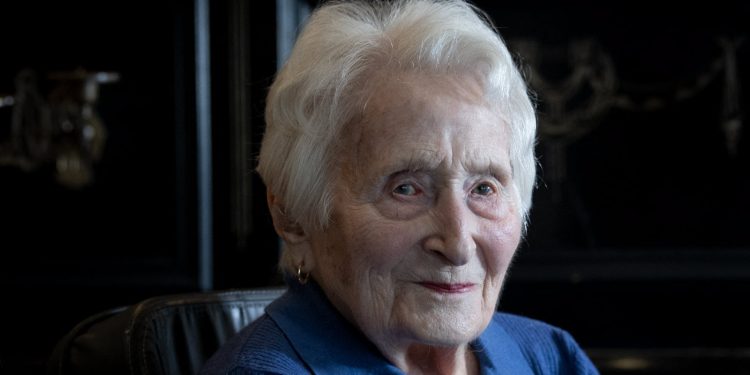NEWS CENTER – It was reported that Odette Nilès died on the night of Friday to Saturday. French President Emmanuel Macron said in a message he shared on Twitter that “Odette Nilès represented a century of devotion and freedom,” and that they will continue to stick to her memories.
Nilès was born on December 27, 1922 in Paris. From 1940 he became a member of the Young Communists. She distributed leaflets and participated in demonstrations during the Nazi occupation. She was arrested in August 1941 and put in a camp set up in the Loire-Atlantique region in the west of the country. There she met the famous communist resister Guy Moquet. Moquet, along with 47 other insurgents, was unjustly executed.
At the border barrier between men and women before the executions, Nilès had promised Moquet a kiss she could never give again. However, Moquet’s last message to Odette Nilès was: “I will die (…) without having what you promised me.” Odette Nilès, always called “Guy Moquet’s fiancee” for this reason, was then sent to other camps for three years. She escaped from the Mérignac camp in 1944 and joined the Resistance in Bordeaux.
After the war, Odette Nilès remained committed to the communist ideal and continued her fight for women’s rights.
Odette Nilès died on the night of Friday May 26 to Saturday May 27 at the age of 100. The communist resistant was the last survivor of the Choisel camp, where she had met Guy Môquet, her “fiancé” , shot before the kiss she had promised him.
“Odette Nilès represented a century of commitment and freedom , ” wrote Emmanuel Macron on Twitter on Saturday, the day of the 80th anniversary of the creation of the National Council of Resistance. The national secretary of the French Communist Party (PCF), Fabien Roussel, paid tribute to “a friend and a comrade that we cherish (…) a great figure of the Resistance”.
A communist childhood
Born on December 27, 1922 in Paris to working-class parents, Odette Lecland – her maiden name – moved at the age of 3 with her family to the suburbs, to Drancy, in the heart of the future red belt. His father joined the PCF at the Congress of Tours . She was part of the Secours rouge and then of the Jeunes filles de France. Its heroines are Rosa Luxemburg and Dolores Ibarruri, the Spanish Pasionaria.
From the start of the war, the high school student distributed leaflets and took part in demonstrations on the Grands Boulevards in Paris. She was arrested by the French police on August 13, 1941 at the Richelieu-Drouot metro station on her way to one of them. Along with sixteen boys.
All are under 20 years old and appear in court-martial, before the Germans. The death penalty is required. Three will be executed, the others imprisoned.
She was quickly transferred to the Choisel camp, in Châteaubriant (Loire-Atlantique). In the barracks, wooden crates infested with vermin serve as beds. She meets Jean-Pierre Timbaud – he will be shot at the same time as Guy Môquet – but also Jackie, Paulette, Marie… Six great friends, the “Bistouillardes ” , “sisters” for life, she declared.
Faithful to her communist ideal
After the war, Odette Nilès also remained faithful to her communist ideal all her life and campaigned for women’s rights. Director of the secular patronage of the city of Aubervilliers, she meets Yuri Gagarin and dines with Fidel Castro. Her husband, Maurice Nilès, became deputy (1958-1985) and PCF mayor (1959-1997) of Drancy.
For decades, she testified in schools, tirelessly, to bring to life the memory of her comrades who were shot.
The last survivor of the Choisel camp had peacefully passed the 100-year mark at the end of December in her retirement home in Drancy. But remained haunted by this Marseillaise sung loudly with the others to accompany their brothers in the peloton, this October 22, 1941.




